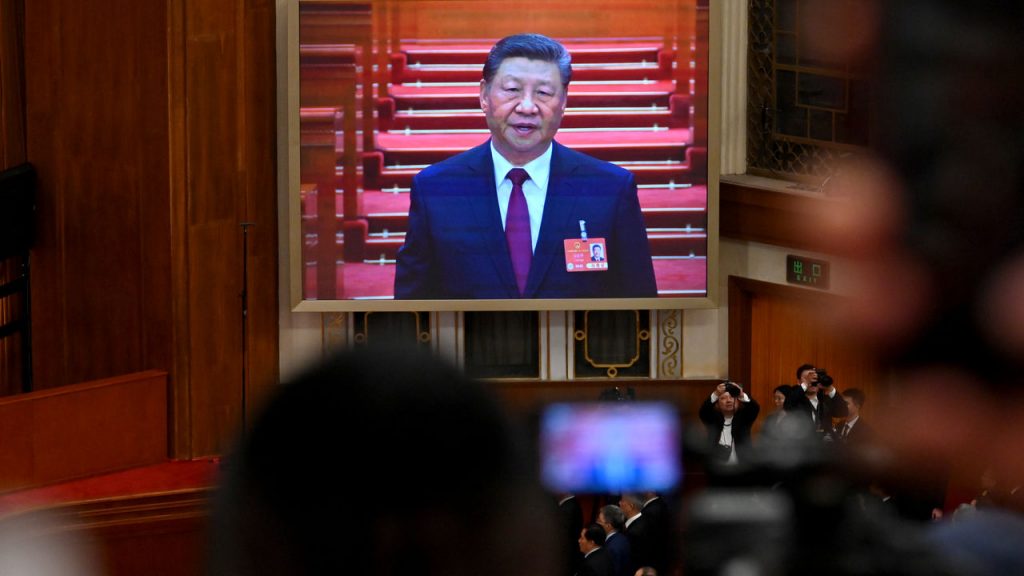The ongoing trade war between the United States and China has reached a critical juncture, with the U.S. government announcing an unprecedented tariff of 104% on Chinese imports. This decision, made public in early April 2025, marks one of the steepest escalations in the economic conflict and raises significant questions about the future of global trade dynamics.
A Dramatic Shift in Trade Relations
The announcement was made during an event held at the White House, where President Donald Trump touted the administration’s strength in negotiating tailored trade deals with other nations. “These are tailored, highly tailored deals,” he remarked, suggesting a strategic approach to trade policy that emphasizes individual agreements rather than blanket tariffs.
The White House’s decision to implement a 104% tariff on Chinese goods was underscored by previous tariffs already imposed, bringing China’s total tariff liabilities up to 70% on certain imports. The escalation comes amid a backdrop of global economic uncertainty and highlights a significant deviation from traditional trade practices where punitive tariffs seek to offset trade imbalances.

The Immediate Impact of Tariffs on U.S.-China Relations
The introduction of the 104% tariff not only affects the trade flow between the U.S. and China but also sends ripples through the global economy. Analysts predict that this dramatic action could trigger retaliatory measures from China, which has vowed to respond decisively.
In the past, China had indicated that it would match any increases in tariffs initiated by the U.S. This tit-for-tat strategy continues to escalate tensions, leading to doubts over the possibility of achieving a diplomatic resolution. In a statement, Chinese officials declared their commitment to “fight to the end,” indicating the robust stance they are taking against what they perceive as economic aggression from Washington.
Reactions from Global Leaders
The global community is watching closely as these developments unfold. International leaders express concern about the potential for a severe impact on the world economy. For instance, representatives from Japan and South Korea have signaled their intent to engage with the U.S. to negotiate terms which might cushion their economies from a recession.
Moreover, recent reports indicate that controversial discussions regarding a new nuclear deal with Iran are coinciding with this trade conflict. Trump’s administration is trying to leverage its diplomatic engagements to negotiate a new framework that asserts U.S. dominance on the global stage. However, this complex interplay between trade and diplomacy could further complicate relations not just with China but with other nations as well.
Economic Implications of the Trade Escalation
The economic implications of the U.S.-China trade war are profound. The steep tariffs impose higher costs on American consumers and businesses reliant on Chinese imports. As prices for goods climb due to tariffs, many economists warn of impending inflation rates that could tip the U.S. economy into recession.
Furthermore, market analysts are predicting decreased corporate profits, which could result in job losses across multiple sectors. Industries that rely heavily on trade—including technology, manufacturing, and agriculture—are bracing for challenging times ahead.
Long-Term Effects on Global Trade Structures

Longer-term, this aggressive tariff policy could lead to a restructuring of global trade networks. Countries may seek alternative partners to mitigate the impacts of U.S. tariffs, potentially distancing themselves from both the U.S. and China. This shift might pave the way for new alliances while fostering a more multipolar global economy.
Furthermore, developing nations might find opportunities to expand their markets as companies reassess their supply chains and look for avenues to reduce their exposure to tariffs. This overshadowing dynamic could reshape global economies significantly as new trade routes emerge.
Conclusion: A Path Forward
As the dust settles from the implementation of these new tariffs, the path forward will hinge on negotiations between the countries involved. Diplomatic channels must remain open if there is to be any hope of creating a framework for sustainable trade practices that provide mutual benefits.
In this charged atmosphere, the international community has a vested interest in fostering dialogue rather than escalating tensions. Ultimately, a balanced approach that encourages cooperation instead of confrontation will be essential to navigate this complex landscape of trade and diplomacy.
“It is as much an opportunity as it is a test. The ball is in America’s court.” – Iranian Foreign Minister Abbas Araghchi
As we navigate these tumultuous waters, insights from diplomatic relations and the socio-economic landscape will be critical in shaping the future of international trade.

